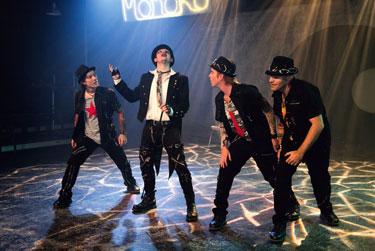Almost Like Clockwork
Scena's gung-ho production of ''A Clockwork Orange'' enhances your impression of Anthony Burgess's story
Anthony Burgess came to loathe so intensely the one piece of literature he’s best known for, a few years before he died he created a musical adaptation of it.
A Clockwork Orange: The Musical – it just has the ring of farce to it, right?

A Clockwork Orange
(Photo by Robert Bowen)
Of course, Burgess adapted his most famous – and infamous – work not exactly as a musical, but as a ”play with music.” And the point wasn’t to make light of its angst-ridden tale of listless teenagers and intolerable adults – anarchy vs. totalitarianism – but to distinguish it from Stanley Kubrick’s incendiary 1971 film adaptation. To this day, when someone mentions A Clockwork Orange, most everyone thinks of Kubrick, not Burgess.
Robert MacNamara has wanted to stage A Clockwork Orange essentially from the moment he co-founded his stalwart theater company Scena – the same year Burgess published his adaptation – in 1987. After decades of waiting in the wilderness, MacNamara’s determination has paid off in a gung-ho production, now at the H Street Playhouse, that enhances your impression of the story.
The play, you see, is every bit as confusing and troubling as Kubrick’s film – but it also has a clearer resolution. Kubrick based his film on the published American version of Burgess’s original story, which inexplicably lopped off the final chapter, in which the story’s anti-hero, Alex, sees the errors of his violent ways and verily, of his own free will, works to reform himself. Without this resolution, the film leaves one feeling a bit hopeless about society’s malcontents – and about government. By contrast, the play helps one keep some sense of faith in humanity and authority.
And while the play outlines the same wanton violence – and violent sex – as the film, it’s certainly not as graphic or as glorifying as Kubrick’s version. To be sure the violence colors our image of Alex – and of the authorities. But it doesn’t paint over the larger picture. The play allows us to see the story’s shades of gray. Neither Alex nor the crime-fighting authorities are all bad, all the time.
Chris Stinson plays the role of Alex with particular zeal, blinding the audience, to say nothing of his friends and partners-in-crime – in Burgess’s parlance, ”droogs” – with his boyish charm, to the point it becomes too easy to overlook his many transgressions. We don’t like what he does, you could say, but we sure like how he does it. The character of Alex is in nearly every scene, and over the course of the play conveys pretty much every emotion known to man. Because he pulls it off with such ease, it’s hard not to think there are far bigger things to come for stage newcomer Stinson, whose lead credit until now was starring in this year’s award-winning Capital Fringe show We Tiresias.
Support Metro Weekly’s Journalism
These are challenging times for news organizations. And yet it’s crucial we stay active and provide vital resources and information to both our local readers and the world. So won’t you please take a moment and consider supporting Metro Weekly with a membership? For as little as $5 a month, you can help ensure Metro Weekly magazine and MetroWeekly.com remain free, viable resources as we provide the best, most diverse, culturally-resonant LGBTQ coverage in both the D.C. region and around the world. Memberships come with exclusive perks and discounts, your own personal digital delivery of each week’s magazine (and an archive), access to our Member's Lounge when it launches this fall, and exclusive members-only items like Metro Weekly Membership Mugs and Tote Bags! Check out all our membership levels here and please join us today!


























